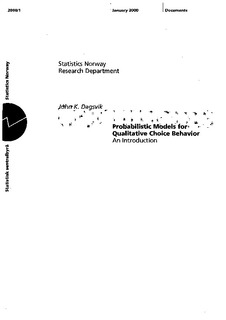Probabilistic models for qualitative choice behavior : an introduction
Working paper
Permanent lenke
http://hdl.handle.net/11250/180992Utgivelsesdato
2000Metadata
Vis full innførselSamlinger
- Notater / Documents [293]
Sammendrag
Preface:
The econometric discipline has been criticized for being too similar to mathematical statistics and only to
a limited degree linked to formalized theoretical models. This is particularly the case as regards
formulation and specification of the stochastic elements in econometric models. Ragnar Frisch, who is
known to be the originator of econometrics, expressed both in theory and practice an opposite ideal;
namely econometrics as an almost symbiotic blend of statistical methodology and mathematically
formulated theory, cf. Frisch (1926). See also Bjerkholt (1995).
Theory and econometric methodology for qualitative choice behavior is developed in a tradition
which I believe is somewhat closer to the ideal of Frisch than much of the traditional textbook approach
to econometrics. This stems from the fact that the theory of qualitative choice is rooted in a tradition
where probabilistic concepts and formulations play a key role in contrast to the point of departure in
traditional micro theory, which is deterministic. Since probabilistic concepts are integral parts of the
theory of qualitative choice this means that the gap between theory and empirical model specification in
applications often becomes less wide than is the case in the traditional micro-economic approach.
The present compendium is a fifth revised version of an introductory course in the theory of
qualitative choice behavior (often called the theory of discrete choice).
